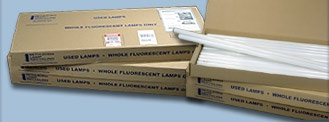MENU
Fluorescent Bulbs and Mercury Switches should be Recycled as Universal Waste
Fluorescent bulbs are mercury-containing lamps regulated by the Universal Waste Rule (40CFR273) to encourage recycling. These lamps are exempt from the more stringent management standards for hazardous waste if recycled.
Mercury is an element that can come from both natural and man-made sources. Coal fired power
plants are a primary man-made source, as mercury that naturally exists in coal is released into the
air when coal is burned to make electricity. Coal-fired power generation accounts for roughly 40%
of the mercury emissions in the U.S.
Although salvage yards generate very few bulbs each year special handling is required:
- Store spent fluorescent bulbs in a sturdy container to prevent breakage during accumulation, storage, and transportation. Label the storage container “Used Lamps” and mark it with the date the first bulb was placed in the container to document the one-year time limitation.
- Provide proper training to employees responsible for the storage of used lamps (i.e. storage, labeling, etc.) and capture and contain all accidental releases from broken lamps with the same care as other hazardous waste.
- Recycle used lamps through a bulb recycling facility. The recycler will provide storage containers upon request. Maintain the shipment record until disposal is completed.
Options for Bulb Management
•Many salvage facilities recycle their spent fluorescent bulbs through their supplier of new bulbs. These suppliers are known as Universal Waste Handlers. This is a cost effective and convenient way to properly manage spent bulbs as long as the supplier/UW Handler can document that the bulbs are ultimately being recycled.
•Often the supplier does not take back spent bulbs in which case a recycling service must be used.
1) A-TEC Reycling, Inc. in Des Moines offers a pickup service that can be used for a large volume
of spent bulbs as there is a $100 minimum pick up fee.
2) Bulbs can also be dropped off at the A-TEC in Des Moines for a minimum drop off fee of $25. They also
recycle unusable computers and monitors, a growing waste steam known as E-Waste.
3) Prepaid packaging can be a convenient option for facilities without access to a UW Handler or recycling center. Specially designed shipping boxes safely ship standard 4', 6', 8', u-tube, compact fluorescent and HID lamps for recycling. The boxes conform to all U.S. Department of Transportation and EPA Universal Waste regulations. Simply purchase the desired quantity of boxes to meet your needs, insert the lamps you wish to recycle and ship via UPS™ to the recovery facility.
$20 Mini-Tube Prepaid packaging can ship Eight (8) 4-foot T-12 bulbs or Fourteen (14) 4-foot T-8 bulbs.
$70 4-foot Bulbs Prepaid box can ship 36 T-12 or 70 T-8 bulbs.
$75 8-foot bulb Prepaid box can ship 22 6- or 8-foot T-12 bulbs or 40 6- or 8-foot T-8 bulbs.
•With proper documentation from the manufacturer green-tip bulbs may be landfilled. The green-tip bulbs boast low mercury levels and longer life for twice the environmental benefit. The manufacturers encourage consumers to recycle green-tip bulbs. One advantage of the low mercury bulbs is that they do not contain mercury above the regulatory limit of 0.2 mg/L.
With documentation provided by the manufacturer, a facility generating
spent green-tip fluorescent bulbs may landfill the bulbs, as long as the
local or state regulatory agency allows it, as is the case in Iowa.
The Generator of the spent green-tip bulb must prove that the bulbs
are non-hazardous either through laboratory analysis or by thorough
knowledge such as keeping the manufacturers' low-mercury statement
on file at the facility.
Download TCLP Data for Sylvania Bulbs as proof of
non-hazardous status for green tip bulbs.
Mercury Switches
CAR certification requires that the company participates in the National Vehicle Mercury Switch Recovery Program (NVMSRP) or the equivalent state program.
On August 5, 2005, federal rules required that mercury-containing equipment requiring disposal are considered Universal Waste (40 CFR 273) and, therefore, are exempt from the more stringent management standards for hazardous waste under the federal Resource Conservation and Recovery Act (RCRA) if recycled.
On January 1, 2007, the Iowa Mercury-Free Recycling Act required the removal of automotive mercury-containing convenience light switches from scrap automobiles before crushing or shredding. The law also requires payment for each mercury light switch that is recovered and properly recycled.
Once removed from the vehicle, mercury switches must be stored in a leak proof, closed container that will prevent the mercury capsule from breaking. Generators of mercury switches cannot accumulate the waste for more than one year. Each container that holds mercury switches must be labeled accordingly (i.e. “Universal Waste”). Along with clearly labeling the contents of the waste containers, identify the length of time the waste has been accumulated. This can be done simply by adding the date that the first switch was placed in the container to the label. ELVS program can be reached at 734-547-2511.
UNIVERSAL WASTE












